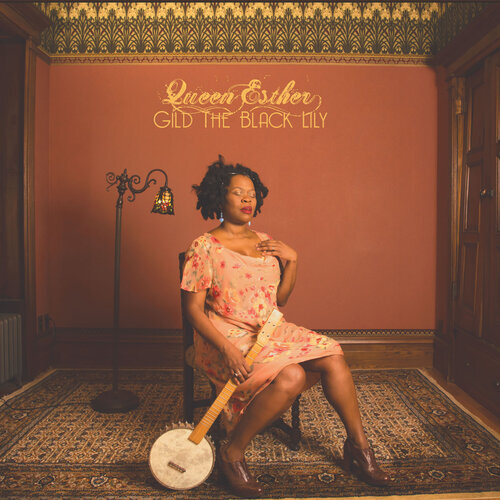Music Review: Queen Esther
Gild the Black Lily
The new release by Harlem-based Americana artist Queen Esther is an instant classic.
Hailing from New York City but with deep roots in the South, Queen Esther manages to exude a preservationist feel in her music while putting a distinctly modern stamp on it. Beginning to end, Gild the Black Lily is as pure and enjoyable an album of old-time country, blues, gospel and folk music as you’ll ever hear. (And dig that swoon-worthy cover—I could write a whole other article just about that!) It’s fresh and original—not an imitation—and there are other obvious music influences at work in it, but the lineage between it and old Americana music is direct and clear.
In 45 minutes she delivers a comprehensive blend of cowgirl (you heard me!) ballads, gospel, folk, drinking songs, and even an Eagles cover. For an album this consistent in sound and feel, it’s also surprisingly diverse. There’s a song for just about every mood and type of Americana you prefer. I don’t listen to albums all the way through too often these days, but this is a record built for that. All the songs are equally strong, but several quickly surfaced as my favorites—including the very first one.
Esther opens the album with “Black Cowgirl Song,” immediately staking her place in the country/Western landscape with a fun, loping ballad about prairie life that could be mistaken for a traditional cover save for the reference to “airline roads” in the sky. (It also taught me some new vocabulary: “popskull” and “absquatulate”!)
Her intention to reclaim Americana for Black women now established, Esther quickly and delightfully changes pace with the next song, “John the Revelator,” a widely covered traditional gospel song first recorded by Blind Willie Johnson in 1930. Esther uses the lyrics from the 1965 Son House version. This rousing, nearly a capella version showcases her powerhouse voice, punctuated only by sparse stomps and claps.
The next song brings us back to classic country with another original, “The Whiskey Wouldn’t Let Me Pray.” The easy tempo and infectious electric guitar belie the heavy lyrics, depicting the narrator’s struggle between alcohol addiction and the salvation of prayer: “Don’t wanna get so high I tell the world goodbye / ‘Cause the whiskey wouldn’t let me pray.” In the spirit of Hank Williams and so many other country poets, songs about torment and hardship can be eminently listenable despite (or perhaps because of) their sad themes. This is one of my very favorites on the album.
On the next song, the mandolin-infused “Oleander,” Queen Esther proves that she knows exactly when to unleash her voice's power and when to soften it to a plaintive murmur. This song demonstrates both sides, but the most striking moments in it are when she deliberately pulls back from notes instead of belting them, imbuing the words with vulnerability. “Oleander” showcases a unique way she has of wrapping her rich voice around syllables, taking her time with them. It’s like she’s tasting each one and stopping to savor the ones she likes.
I know you’ve been wondering about that Eagles cover I mentioned earlier....now, I’m neutral at best on the Eagles, but they’re one of those ubiquitous bands whose biggest hits are recognizable whether you’ve sought them out or not. So “Take It to the Limit” was instantly familiar even if it took me a bit to realize what song it was. I’ve probably heard (and tuned out) that song hundreds of times in my life and never thought anything of it. But in Esther’s hands, it’s reinvented as a country-soul jam complete with churchy organs, slidey electric guitar, and even some girl-group backup harmonies courtesy of Esther herself. Suddenly I’m paying attention to (and loving) this song for the first time in my life!
I didn’t recognize the next song, “Lonesome Road,” a peppy half-gospel, half-vaudeville sounding ditty with incongruously sad lyrics either about weary travels or about dying, but I fell into a fascinating click-hole trying to figure out if it was an original. It’s not--it was written in 1927 and recorded at least 200 times, including by Sister Rosetta Tharpe. I guess I just haven’t been paying attention!
Esther follows up this apparently well-known classic with several originals. One of them, “This Yearning Thing,” is an achingly beautiful ballad with striking, evocative lyrics about unrequited love. As the title suggests, the narrator’s longing is personified as an entity unto itself, almost as if the narrator is having a relationship with it: “Catastrophic lovely hurting thing I feel for you / This yearning thing / It holds me close….”
There are a couple more covers on the album, and one is a spot-on, gender-reversed take on a song made famous by George Jones: “He Thinks I Still Care.” It fits so seamlessly among Esther’s originals that if I hadn’t recognized it might have assumed it was hers. This version ranks right up there among the best renditions I’ve ever heard—her voice and the classic country arrangement are irresistible.
The record closes with an acoustic rendition of “The Whiskey Wouldn’t Let Me Pray.” It made me realize that I haven’t encountered an album capped off with a stripped-down repeat of an earlier song in several years. And it’s another argument in favor of experiencing Gild the Black Lily as a full album; there’s something so powerful about hearing an artist’s alternate take on a song. Both versions of this song have their strengths, and it’s impossible for me to choose which one I like better. And I can’t choose which to feature here, so listen to both and see if you have a favorite!
Follow Queen Esther on Instagram: @queenesthermusic
Listen to “The Whiskey Wouldn’t Let Me Pray”
Then listen to the unplugged acoustic version!
Carol Roth is a full-time marketing copywriter and the main music journalist and social media publicist for Adventures in Americana. In addition to studying the guitar and songwriting, Carol’s additional creative side hustle is writing self-proclaimed “trashy” novels under the pseudonym @taberkeley!




